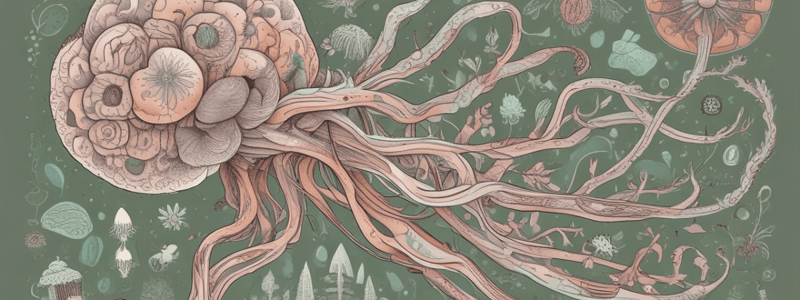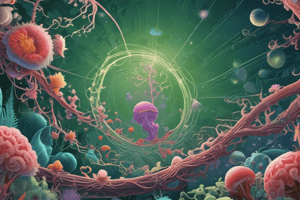Podcast
Questions and Answers
What is the basic unit of life?
What is the basic unit of life?
- Cell membrane
- Cytoplasm
- Mitochondria
- Cell (correct)
What is the process by which organisms that are better adapted to their environment are more likely to survive and reproduce?
What is the process by which organisms that are better adapted to their environment are more likely to survive and reproduce?
- Mutation
- Natural Selection (correct)
- Genetic drift
- Gene flow
What is the study of the interactions between organisms and their environment?
What is the study of the interactions between organisms and their environment?
- Genetics
- Ecology (correct)
- Microbiology
- Botany
Flashcards are hidden until you start studying
Study Notes
Definition of Biology
- Biology is the scientific study of life and living organisms, including their structure, function, growth, evolution, distribution, and taxonomy.
Branches of Biology
- Botany: study of plants
- Zoology: study of animals
- Microbiology: study of microorganisms
- Ecology: study of interactions between organisms and their environment
- Genetics: study of heredity and variation
- Biochemistry: study of chemical processes in living organisms
- Molecular Biology: study of biological molecules and their interactions
Cell Biology
- Cell: basic unit of life, composed of cell membrane, cytoplasm, and genetic material (DNA or RNA)
- Cellular organelles: mitochondria, ribosomes, lysosomes, etc.
- Cell division: mitosis, meiosis, and cytokinesis
Genetics
- DNA (deoxyribonucleic acid): genetic material that carries information for an organism's development and function
- Genes: segments of DNA that code for specific traits
- Inheritance: passing of traits from parents to offspring
- Mutation: change in DNA sequence leading to variation in traits
Evolution
- Theory of Evolution: explains how species change over time through natural selection, genetic drift, mutation, and gene flow
- Natural Selection: process by which organisms that are better adapted to their environment are more likely to survive and reproduce
- Speciation: process by which a new species emerges from an existing one
Ecology
- Ecosystem: community of living and non-living components interacting in an environment
- Food Chain: sequence of organisms that eat other organisms, with energy flowing from one level to the next
- Energy Pyramid: representation of energy flow through an ecosystem, with producers at the base and top predators at the top
Definition of Biology
- Biology is the scientific study of life and living organisms
- The study encompasses the structure, function, growth, evolution, distribution, and taxonomy of living organisms
Branches of Biology
- Botany: the study of plants
- Zoology: the study of animals
- Microbiology: the study of microorganisms
- Ecology: the study of interactions between organisms and their environment
- Genetics: the study of heredity and variation
- Biochemistry: the study of chemical processes in living organisms
- Molecular Biology: the study of biological molecules and their interactions
Cell Biology
- Cell: the basic unit of life, composed of cell membrane, cytoplasm, and genetic material (DNA or RNA)
- Cellular organelles: mitochondria, ribosomes, lysosomes, etc.
- Cell division: occurs through mitosis, meiosis, and cytokinesis
Genetics
- DNA (deoxyribonucleic acid): the genetic material that carries information for an organism's development and function
- Genes: segments of DNA that code for specific traits
- Inheritance: the passing of traits from parents to offspring
- Mutation: a change in DNA sequence leading to variation in traits
Evolution
- Theory of Evolution: explains how species change over time through natural selection, genetic drift, mutation, and gene flow
- Natural Selection: the process by which organisms that are better adapted to their environment are more likely to survive and reproduce
- Speciation: the process by which a new species emerges from an existing one
Ecology
- Ecosystem: a community of living and non-living components interacting in an environment
- Food Chain: a sequence of organisms that eat other organisms, with energy flowing from one level to the next
- Energy Pyramid: a representation of energy flow through an ecosystem, with producers at the base and top predators at the top
Studying That Suits You
Use AI to generate personalized quizzes and flashcards to suit your learning preferences.




